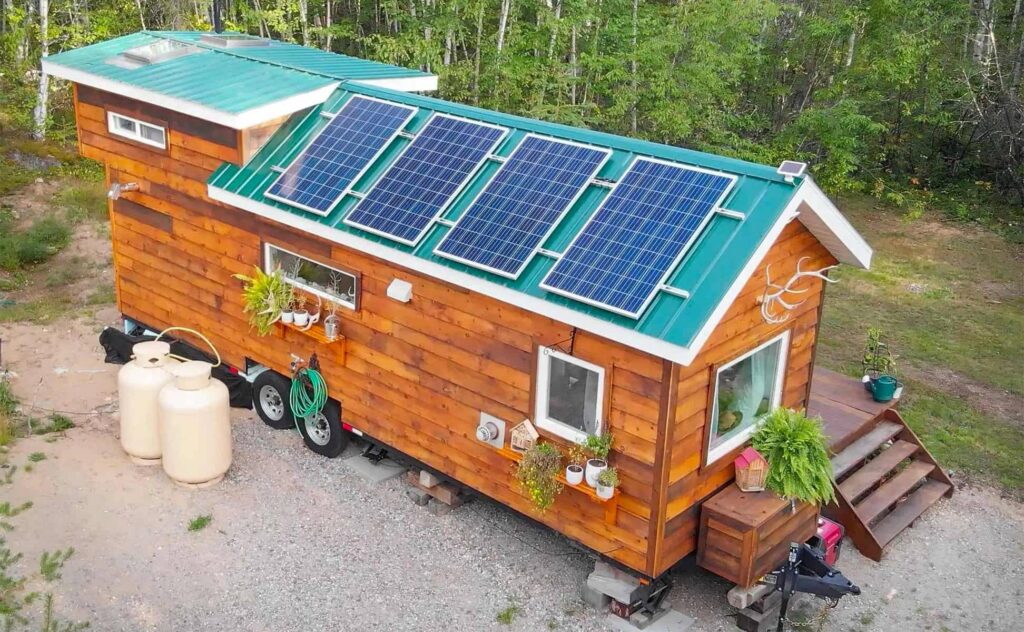
The Ultimate Guide to Off-Grid Living with Renewable Energy
Introduction
Hey there, future off-gridders! You’re here considering the idea of off-grid living with renewable energy has probably crossed your mind increasingly than once. I’ve been doing this for years, and let me tell you, it’s not just a pipe dream—it’s doable, and it’s awesome. This guide will walk you through the ins and outs of making the leap to a self-sufficient life. Buckle up!

The Off-Grid Lifestyle: What It Really Means
The Real Scoop
You might think off-grid living is well-nigh isolating yourself in the wilderness, living off berries and river water. Nah, it’s far from that. Off-grid living is well-nigh freedom—the self-rule to live on your own terms, to use energy responsibly, and to make choices that uncurl with your values.
Life Changes and Commitments
Going off-grid isn’t a weekend hobby; it’s a lifestyle. It involves investment—not just money but moreover time and learning. The good news? You get the peace and serenity that comes with a life less cluttered by modern distractions.
Anecdote: When I first went off-grid, I struggled with things like solar panel placement and energy storage. But every hurdle was a lesson. Now, I can’t imagine going when to a life where I’m not in tenancy of my own energy.
Why Renewable Energy?
For Mother Earth
Let’s squatter it, the planet isn’t getting any younger, and we’ve got to start treating her better. Using renewable energy helps you reduce your stat footprint. So you’re not just living free; you’re moreover living responsibly.
Long-Term Savings
Renewable energy systems might seem expensive initially, but in the long run, you’re looking at significant savings. No increasingly monthly electricity bills? Yes, please!
Energy Independence
Forget well-nigh power outages and grid failures. With your own renewable energy sources, you’re the boss.
Types of Renewable Energy to Consider
Solar Power
How it Works: Solar panels capture sunlight and turn it into electricity. Simple, right?
Cost vs. Benefit: Solar panel prices have been plummeting. They’re a fantastic long-term investment. Plus, with federal and state incentives, the deal gets plane sweeter.
Maintenance: Just a little cleaning now and then, and you’re good to go.
Wind Energy
Small Residential Turbines: Don’t misplace these with the massive turbines you see in wind farms. Residential turbines are smaller but still mighty constructive if your location is right.
Anecdote: I’ve got a buddy who lives atop a hill, and his wind turbine setup is so constructive that he sometimes generates increasingly energy than he can use!
Hydroelectric Power
Where and When: If you’re lucky unbearable to have a water source on your property, you’ve hit the off-grid jackpot. Hydroelectric power is super efficient but depends a lot on the seasonal water flow.
Other Options: Geothermal, Biomass
If you have specific conditions like unvarying underground heat (geothermal) or well-healed organic material (biomass), these options could be worth exploring.
How to Evaluate Your Energy Needs
First things first, you need to know how much energy you’re going to use. Squint at your current electricity snout and consider how your usage might change. Scaling your renewable energy setup virtuously will save you both money and headaches later on.
Battery Storage and Backup
The Importance of Storage
You’re not unchangingly going to slosh energy the moment you produce it. That’s where shower storage comes in. Batteries store the glut energy for times when the sun isn’t shining or the wind isn’t blowing.
Types of Batteries
Lead-acid batteries are cheaper but have a lower lifespan. Lithium-ion batteries are pricier but increasingly efficient and longer-lasting. Choose equal to your needs and budget.
Backup: Don’t Skip This
A replacement generator is like an insurance policy. It’s there for emergencies and offers peace of mind.
The Nitty-Gritty: Permits and Legal Stuff
Listen, I know legal stuff can be a drag, but it’s crucial. Most places will require you to obtain some sort of permit, expressly for things like water systems. Do your research and comply; you don’t want to squatter fines or legal whoopee lanugo the line.
Costs and Financing
Setup Costs
The initial setup can be pricey, but remember, you’re investing in a lifetime of energy independence.
Federal and State Incentives
The government is surprisingly supportive of renewable energy efforts. Tax credits, rebates, you name it—make sure you take wholesomeness of these.
Creative Financing
Ever heard of community-shared solar projects? These indulge multiple people to invest in a single renewable energy project. It’s like crowdfunding for your energy needs.
Real-life Case Studies
Meet Emily from Colorado, who’s rocking a mixed setup of solar and wind energy, and Mark from Oregon, who has fully embraced hydroelectric power. Their stories are packed with practical tips and lessons learned.
FAQ: Your Burning Questions Answered
Is renewable energy reliable? What’s the ROI on a solar panel setup? Can I go off-grid in a suburban area? We’ve got all these questions covered and more.
Conclusion
Alright, that wraps up our ultimate guide. Going off-grid with renewable energy isn’t just a lifestyle choice; it’s a statement—a statement that says you’re single-minded to freedom, responsibility, and the well-being of this planet we undeniability home. Trust me, take the plunge, and you won’t squint back.
Additional Resources
For those of you who are just itching to learn more, I’ve got a list of books, websites, and online communities that’ll alimony you busy.

